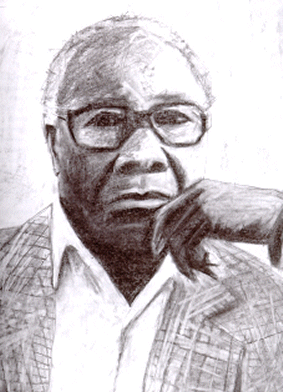This resource is hosted by the Nelson Mandela Foundation, but was compiled and authored by Padraig O’Malley. It is the product of almost two decades of research and includes analyses, chronologies, historical documents, and interviews from the apartheid and post-apartheid eras.
Govan Archibald Mbeki
Govan Archibald Mbeki was born on 8 July 1910 in Mpukane Location in the Nqamakwe district of the Transkei. He obtained a BA degree and a Diploma in Education from the University of Fort Hare in 1936. In 1941 he became Secretary of the African Voters' Association and served in the Bunga. In the 1950s, while teaching in Northern Natal, he was fired for organising coal workers. He went into full-time journalism in 1954 and was appointed Eastern Cape manager of New Age and Spark and their banned predecessors. He was a member of the team of African intellectuals who drafted the African Claims in 1943. He was served with his banning order in 1962, after which he went underground. At the time of his arrest in 1963 at Rivonia he was a member of the National Executive Committee of the ANC, of the Central Committee of the SACP, and a member of the High Command of Umkhonto weSizwe. In the late 1950s he often chaired conferences of the ANC.
He obtained a BA Hons (Economic) degree in prison.
He was released in 1987. In 1994, he was elected to Parliament and became Deputy President of the Senate.
He has written several books and pamphlets, including The Transkei in the Making (1938), a booklet on co-operatives entitled Let's Do it Together, The Peasant's Revolt, published in 1964 by Penguin Africa Library, London, Learning from Robben Island – the Prison Writings of Govan Mbeki, published in 1991 by David Philip, Cape Town.

Govan Mbeki
by Sam Nhlengethwa
Profile
His quiet smile is accompanied by a deep, warm chuckle. His turn of phrase is often bears a tone that suggests how much he relishes the spoken word.
Though he has served in many capacities and various jobs, he was once a teacher. There has remained in him and his mannerisms something of the schoolmaster.
Before the Rivonia arrests he often chaired conferences of the ANC. I have an image of Govan opening such a conference, with his arms spread open like the horns of a bull, and a deep voice somberly intoning, "Comrades, fellow delegates, I take you in my charge …"
Many have described Govan as a person with ruthless determination. The iron will, the firmness of resolve, shines through at all times. Govan would have responded immediately to Mandela's proposal that the Rivonia trialists should not appeal against a sentence of death if it were imposed in their trial. The issue would have been clear-cut, personal. Sisulu would have deliberated the issue and considered its implications for the struggle.
Over the years his ruthlessness became separated from his determination. The perception grew that Govan was just ruthless. I have puzzled over this.
Ruthlessness bears a connotation of having no pity or compassion. This image does not sit comfortably with his soft-spoken calm and gentleness.
Perhaps the answer lies in recognising the teacher, the pedagogue, in him, and therefore the way in which he tends to fashion his behaviour to what he perceives to be required by the objectives that have been set. How many teachers mask their warmth and gentleness with a ram-rod posture and a firmness which often appears as strictness?
There is nothing incompatible between a firmness of resolve and a warmth that exudes from the heart. The heart and head belong together. The demands of the struggle and the way in which one responds can quite easily make them seem incompatible.
A lifetime in the struggle has not rubbed out the pedagogue in Govan.